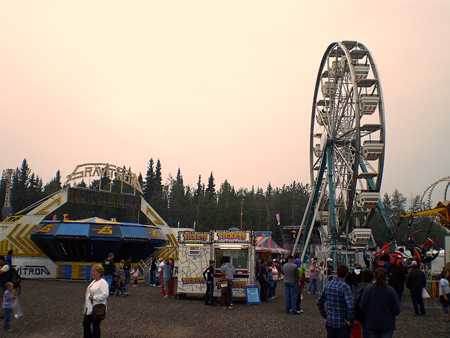Report Reveals Underbelly of Traveling Entertainment Companies
Summer is here, and that means apple pie, baseball and hot dogs are in the hot and humid air. The sun-filled season also means a traveling fair soon will be coming to a town near you.
The amusement rides, carnival games and honky-tonk offered at the fair provide a fun opportunity for the family but often at the expense of personal safety. The culprit: country-crossing companies and their workforce of mostly untrained migrant workers, according to a report published by the American University Washington College of Law titled “Taken for a Ride: Migrant Workers in the U.S. Fair and Carnival Industry.”
The report paints a pathetic behind-the-scenes picture of the otherwise-entertaining industry famous for Ferris wheels, fried food and funny mirrors. It says working conditions for those hired on temporary H-2B visas is downright deplorable, with laborers pulling 14-hours-a-day, seven-days-a-week shifts and getting underpaid.
It further says the long and grueling hours get worse when fairs come to an end and companies move to the next location. Similar to roadies in a band, carnies get no sleep those nights.
“I had to work at least 11 hours per day, but on the days that we assembled or disassembled the rides, we worked until 2 a.m. and barely slept,” a worker named Juan says in the report.
A story on NBCNews.com quoted an attorney with Florida Legal Services as saying the industry is in compliance with the law even though it does not pay its workers overtime. The Fair Labor Standards Act not only exempts companies with H-2B workers from paying them overtime, it also exempts them from the minimum-wage standard.
“…you can pay workers ten cents an hour if you choose,” lead lawyer Greg Schell said.
The treatment of the workforce translates into the quality of the fair experience, specifically with regard to risky rides. The NBCNews.com story chronicled a woman who had a tragic accident three years ago on a rollercoaster at the Salem Fair in Virginia. Soon after she hopped on the ride with her friend, the car got stuck on the track as another car was barreling toward it from behind. The girls – then in high school – tried to get the attention of the operator but to no avail.
“We saw the other car coming for us, and we braced ourselves,” Samantha Goad said.
Goad was taken to a hospital via ambulance with a severe injury to her cervical spine.
International Association of Amusement Parks and Attractions’ statistics find an accident such as hers to be as rare as it was serious. The association’s 2012 Fixed-Site Amusement Ride Injury Survey states an approximate 6.8 percent of injuries reported that year resulted in immediate hospitalization. The remaining injuries were deemed not serious.
“The proportion of injuries that were serious in 2012 was up 58% from the proportion in 2011 and was the highest since 2006,” according to the survey. “The rate of serious injuries per million patron-rides was 0.06 in 2012 – up 50% from 0.04 in 2011 and also the highest since 2006.”
While injuries such as Goad’s rank among the scant minority, they do occur. Other accidents occur because of faulty acts by the rider, such as standing up during a ride. Whatever the case may be, here are some safety tips to follow when heading out for some old-fashioned fun.
- Read the age rules and health warnings and follow them.
- Observe the ride before jumping aboard so you know its speed, turns and twists.
- If you decide to go for it, make certain your safety belt is locked, and always ask an operator if you are unsure.
- All of your body parts should remain inside the ride for its duration. Standing up on a ride is a definite no-no, as that could be fatal.
To prevent neck injuries, keep your head forward and, if there’s a headrest, pressed to it.
Refrain from getting on a ride that looks rickety or poorly maintained. It’s best to follow your instinct.
Parade Magazine writes, “As much as it’s your responsibility to take care of yourself, it is important to look out for the safety of others on the ride as well. If you see unsafe conditions or behavior, report it to a park employee immediately. You never know: your comment could save a life.”
Share This



